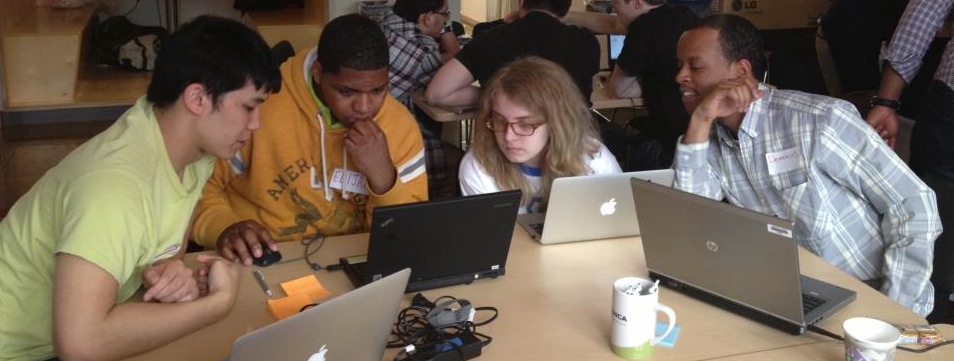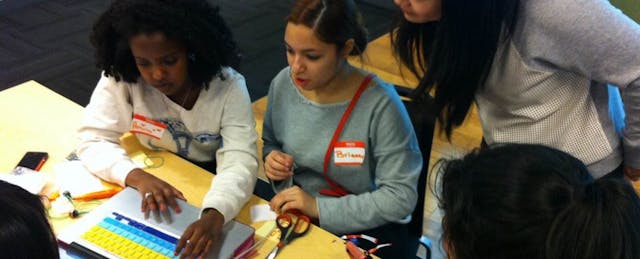There are plenty of initiatives out there focused on getting kids more invested in computer science, but what happens when an entire school builds itself around coding?
In the heart of the Big Apple, one school is doing exactly that. It’s not a private school, and it’s not in the newest or shiniest quarters. For many New York City schools, open space is hard to come by, and the Academy of Software Engineering (AFSE), a public Career and Technical Education high school in the heart of Manhattan, knows this all too well. “We’re in a space with six other schools,” reports Principal Seung Yu, a former teacher who founded AFSE four years ago.
Yet despite cramped corners, the 432-student school has made milestones. In the last year alone, the school received 2400 applications for 108 freshmen spots—up from about 800 applications in its first year back in 2012.
Let’s take a look inside.

The Origins of the Academy
Principal Yu doesn’t have a background in coding, but back when he was a teacher in Brooklyn, he quickly saw how quickly kids of color and students with disabilities were falling behind in technical skills.
“I'm not a tech expert, but I saw how vital it was,” he says. “I wanted kids to walk out of the school with real skills.”
While attending NYC Leadership Academy’s “Aspiring Principal Program,” Yu came in contact with Fred Wilson, a Partner at Union Square Ventures. The venture capitalist was looking to put money into a school that pushed for better computer science instruction, and fatefully, Yu was interested. “I thought, ‘What can kids walk away with? What’s possible?’” he says.
Fast-forward to now, and teenagers from all five of NYC’s boroughs (50% from Manhattan and 50% from the other four) are making the trek out to AFSE.
On the Inside: Coding-Based Instruction
When the school first started in 2012, Yu couldn’t find a computer science curriculum that fit what he was looking for—one that encouraged kids to fail and gave them a range of computing experience. But after four years, he and his team have built a program that ensures that students are “exposed not only to rigorous academics, but also to skills that could be applied on the outside.”
Building the curriculum from scratch: AFSE’s computer science curriculum consists of five pillars: Project Management/General Engineering Practice, Professional Behavior, Computation (Algorithmic) Thinking, Problem Solving, and Role of Computers in Society. This interdisciplinary approach recognizes that computer science isn’t just about coding or computers, but also involves problem-solving skills that can be applied to other subjects such as math and social studies.
In reality, students are only taking one period of computer science 3-4 times a week, yet they complete 8 full courses by the time they graduate, including:
- Introduction to Computer Science, a course that seeks to equalize student abilities and teaches them the basics of Python, HTML, CSS and data analysis (9th grade)
- Programming in Java
- AP Computer Science A and AP Computer Science Principles
- Data Structure and Algorithms
Developing educators—instead of looking for jaded coders: With all of these courses, one may be wondering: who’s teaching? Yu reports that only one of his computer science teachers has a technical background. The others, like Eric Allatta, are teachers with other subject matter expertise. But Yu says that part of the beauty of AFSE is the fact that the inexperience makes for better experimentation in instruction. In fact, a lot of AFSE teachers experiment with coding—something that the New Yorker picked up on last year when it profiled one of AFSE’s English teachers. “Our teachers who do not have a coding background (which is the majority) are curious to learn more about how to incorporate CS into their own disciplines,” Yu reports.
Yu also stresses that when it comes to teaching coding, his staff isn’t finding what they need online. AFSE has Google Apps for Education, and 1:1 devices featuring a mix of MacBooks, Lenovo, and Chromebooks. But when it comes to computer science products, “the teachers are really developing their own tools and activities.”
Interdisciplinary learning and partner coding: AFSE’s curriculum emphasizes interdisciplinary learning. Take the “GenTech” class, which serves as an entrepreneurship crash course and teaches students financial literacy skills. In Allatta’s class, he encourages students to think about coding functions like they think about math functions. Over in Sean Stern’s classroom, students look at public data sets to study the prevalence of “stop and frisk” practices in NYC.
Stern’s classroom also provides prime examples of student collaboration in action. Walk into his room, and one will see teams of five juniors each coding an anagram—defining methods and drawing the letters in Java. Yu says that with each passing year, his teachers are experimenting more and more with partner coding or “pair programming,” which is being touted by universities and adult programming bootcamps alike. “It can function like collaborative writing in the classroom,” he says.
On the Outside: Projects and Internships
While AFSE students are graded on an A to F scale and eventually have to complete a technical assessment at the end of 12th grade, Yu reports that the school’s next big move is towards mastery-based assessment and “getting teachers to be more explicit about what kids need” to meet their career goals.
Career readiness is a major component of AFSE’s offering, and the school staff focuses on providing students with opportunities to develop skills they’ll need in the work force. First, there is “work-based learning.” Each year, students are required to visit companies (which range from Google to Facebook to RGA) and engage in job shadowing or internships. For example, during AFSE’s very first year, sixteen freshmen interned at Morgan Stanley—and got paid for it.
Then there’s facilitated mentorship through the iMentor program, in which adults from technical backgrounds meet with students once a month in person, and regularly communicate with them over email. AFSE also makes a point to bring in female mentors for female students, and invites female students from other public NYC schools to participate, as well.
What Qualifies As ‘Success’—And What Needs to Improve
When it comes to whether getting into college is championed as a student’s ultimate goal at AFSE, Yu hesitates. “To tell a student that college is the only option means that we aren’t considering their background,” he says. “Let me put it this way—we advocate for kids to have post-secondary options, including college. But if they have other options that allow them to be self-sufficient, then we support them.”
He’s quick to mention that 100 percent of 12th graders—the first senior class the school has had—applied to college this year.
But is AFSE performing at top shape on all levels? Looking at the schools demographics, there’s one big space where there’s room for improvement—and that’s the gender breakdown.
Currently, 80 percent of AFSE’s students are male—and that’s not because of the school’s choosing. AFSE is limited unscreened, meaning any student who expresses interest can apply to get matched by the NYC Department of Education.
Yu admits that he and his team have “a lot of work to do” by way of attracting more female students to computer science. “We have a ‘Just for Girls’ event every spring, with sixth- to eighth-grade girls, seeking to target young leaders in computer science,” he shares, “but there’s definitely space to grow. We haven’t yet worked with elementary schools.”
Yu also shares his belief that he and his team can work with young girls to show that coding doesn’t just mean that one sits in front of a computer all day long. The skills are transferrable to a multitude of different areas—something that Tiara Dillard, an AFSE senior from Harlem, recognizes: “I want to have my own business. Coding will be helpful, so I can create my own website,” she says.
And while may think learning to code can be stressful, senior Emmanuel Castro shares that he’s having fun.
“Yeah, it takes time and dedication,” he starts, “but if it’s something you created, you can be proud of it.”


